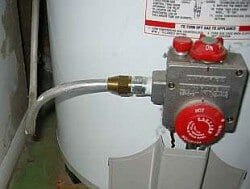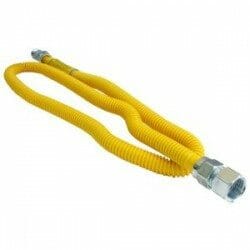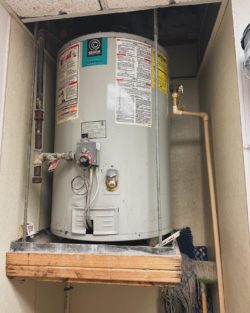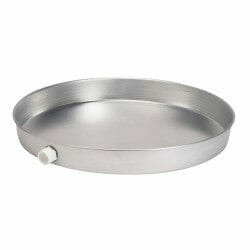Aluminum Tubing Gas Lines On Water Heaters
Home » Plumbing » Water Heaters »
The Use and Safety of Aluminum Tubing for Water Heater Gas Lines

In the realm of plumbing and HVAC installations, the choice of materials for gas lines is paramount, not only for efficiency and cost considerations but also for safety. Aluminum tubing, known for its lightweight, good thermal conductivity, and resistance to corrosion, is a material that raises questions when it comes to its use for water heater gas lines.
Why Aluminum Tubing Might Be Considered
Aluminum’s appealing properties make it a candidate for various applications. Its corrosion resistance is particularly advantageous in environments where moisture is present, which can be a common scenario around water heaters. Its thermal conductivity, while more relevant to heat exchangers and other applications, also suggests its utility in systems where heat plays a role. Furthermore, aluminum is lightweight and often more affordable than other metals, making it an attractive option from a material handling and cost perspective.
The Case Against Aluminum for Gas Lines
Despite its advantages, aluminum tubing is rarely, if ever, used for gas lines leading to water heaters for several reasons:
- Chemical Reactivity: Aluminum can react with certain substances found in natural gas, leading to the formation of aluminum oxide. This reaction can cause clogging and restrict gas flow, posing a significant safety risk.
- Durability Concerns: While aluminum resists corrosion from water, it can be more susceptible to corrosion from other chemicals, including those that might be present in gas. Over time, this can compromise the integrity of the gas line. An additional concern with rigid aluminum tubing is that it can easily crack when bumped or hit. This most often happens at a fitting or connection area where there is more stress from the compression fittings.
- Code Compliance: Most importantly, building codes and standards typically dictate the materials that can be used for gas lines. In many jurisdictions, materials such as black steel, corrugated stainless steel tubing (CSST), and high-density polyethylene (HDPE) are preferred or required for gas lines due to their proven durability and safety. Aluminum is generally not approved for gas piping in residential or commercial installations because it does not meet the necessary standards.
Historically, aluminum tubing was occasionally used for gas lines, including those for water heaters, due to less stringent safety standards and a limited understanding of material reactivity and durability. Over time, advances in material science and an increased emphasis on safety have led to stricter regulations, phasing out aluminum for gas piping in favor of safer, more durable materials.
There are still some building jurisdictions that allow aluminum tubing to be used for the gas line. This is based on whether or not the local gas supply is considered corrosive or not. To get more information about this in your area you can call a local gas company, qualified plumbing contractor and/or the building department. However, the overall consensus today is that if you have an aluminum gas line, it should be replaced.

Aluminum, due to its reactivity with certain chemicals that can be present in natural gas (like sulfur compounds) and its potential for corrosion under certain conditions, is generally not approved for use in gas piping systems. The standards set by organizations such as the National Fire Protection Association (NFPA) or the International Code Council (ICC) typically specify materials that are known for their durability, safety, and non-reactivity with gas, such as black steel, corrugated stainless steel tubing (CSST), and high-density polyethylene (HDPE).
Implications of Using Aluminum for Gas Lines
Using aluminum tubing for a water heater gas line can lead to several implications:
- Safety Hazards: The primary concern with inappropriate materials in gas lines is the risk of leaks, which can lead to explosions or fires. A compromised gas line poses a significant safety and health risk to occupants, including carbon monoxide (CO) poisoning.
- System Failures: Even if a safety incident does not occur, the inefficiency or failure of a gas line can lead to operational issues with the water heater, including inadequate heating or system shutdowns.
- Code Violations: Installing materials that are not up to code can result in legal and financial repercussions, including fines, mandatory replacement, and potential impact on insurance coverage.
Corrective Measures and Best Practices
If aluminum tubing has been used for a water heater gas line, it’s recommended to address this issue promptly:
- Inspection: Have a licensed professional inspect the installation to assess the material used and the condition of the gas line.
- Replacement: If aluminum tubing is found, it should be replaced with a material that is code-compliant and suitable for gas lines, such as black steel or CSST. This work should be performed by a qualified professional to ensure safety and compliance. When replacing the aluminum tubing make sure to use a new flexible gas connector. Most of these connectors are only intended to be used once and are not designed for repeated bending and flexing. Additionally, flexible connectors must be protected from physical damage. They are not allowed to pass through any walls, floors, ceilings or appliance housings.
- Compliance Check: It’s advisable to review local building codes and standards related to gas piping to ensure that any new installation or replacement is fully compliant.
- Regular Maintenance: Regardless of the materials used, regular maintenance and inspection of gas lines and related appliances are essential for safety and efficiency.
Water Heater Aluminum Gas Line Summary
While aluminum tubing offers several benefits in certain applications, its use for water heater gas lines is not advisable due to safety concerns, potential chemical reactivity, durability issues, and code compliance requirements. The priority in any gas line installation should be safety and adherence to local codes and standards. If there are concerns about the materials used in an existing installation, consult with a professional for an inspection and possible replacement.


